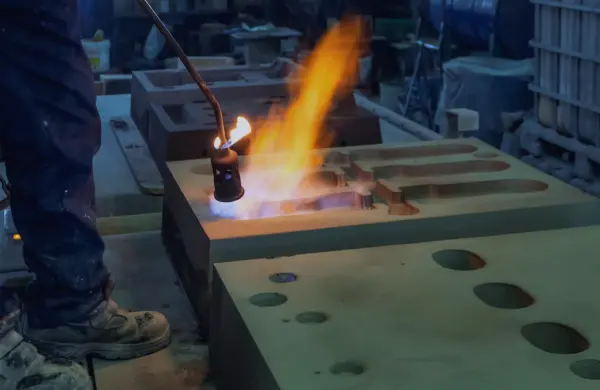A Biased View of Alcast Company
A Biased View of Alcast Company
Blog Article
The Definitive Guide to Alcast Company
Table of ContentsThe Definitive Guide to Alcast CompanyExcitement About Alcast CompanyAlcast Company for BeginnersThe 25-Second Trick For Alcast CompanyLittle Known Questions About Alcast Company.Getting The Alcast Company To Work
Chemical Contrast of Cast Light weight aluminum Alloys Silicon advertises castability by minimizing the alloy's melting temperature and enhancing fluidness during casting. In addition, silicon adds to the alloy's strength and use resistance, making it important in applications where sturdiness is vital, such as automotive components and engine components.It additionally enhances the machinability of the alloy, making it much easier to refine into ended up products. By doing this, iron adds to the general workability of light weight aluminum alloys. Copper enhances electrical conductivity, making it helpful in electric applications. It likewise boosts rust resistance and contributes to the alloy's overall toughness.
Manganese adds to the toughness of aluminum alloys and improves workability (aluminum metal casting). It is typically used in wrought light weight aluminum products like sheets, extrusions, and accounts. The presence of manganese aids in the alloy's formability and resistance to fracturing during manufacture processes. Magnesium is a light-weight aspect that provides stamina and impact resistance to light weight aluminum alloys.
Alcast Company Things To Know Before You Get This
Zinc enhances the castability of aluminum alloys and aids control the solidification procedure during casting. It enhances the alloy's strength and solidity.

The key thermal conductivity, tensile toughness, yield toughness, and elongation differ. Among the above alloys, A356 has the highest possible thermal conductivity, and A380 and ADC12 have the lowest.
Alcast Company Fundamentals Explained

In precision spreading, 6063 is well-suited for applications where detailed geometries and premium surface finishes are critical. Examples include telecommunication enclosures, where the alloy's superior formability allows for sleek and visually pleasing styles while keeping structural integrity. Likewise, in the Lights Solutions sector, precision-cast 6063 components create my explanation sophisticated and effective illumination fixtures that require elaborate shapes and excellent thermal performance.
It causes a better surface area finish and much better deterioration resistance in A360. The A360 shows exceptional prolongation, making it ideal for facility and thin-walled components. In accuracy spreading applications, A360 is well-suited for markets such as Consumer Electronic Devices, Telecommunication, and Power Devices. Its enhanced fluidness enables intricate, high-precision parts like smartphone housings and communication gadget real estates.
The 6-Minute Rule for Alcast Company
Its unique residential properties make A360 an important selection for precision spreading in these industries, enhancing item toughness and top quality. Light weight aluminum alloy 380, or A380, is an extensively utilized spreading alloy with a number of distinctive features. It uses excellent castability, making it an ideal option for precision spreading. A380 displays excellent fluidity when molten, ensuring detailed and thorough molds are precisely reproduced.
In accuracy casting, aluminum 413 radiates in the Consumer Electronic Devices and Power Equipment markets. This alloy's remarkable rust resistance makes it an excellent choice for exterior applications, making certain resilient, long lasting items in the discussed markets.
4 Simple Techniques For Alcast Company
As soon as you have decided that the aluminum die casting procedure appropriates for your task, a critical next action is deciding on the most appropriate alloy. The light weight aluminum alloy you pick will considerably affect both the casting procedure and the residential properties of the last product. Because of this, you must make your choice thoroughly and take an informed technique.
Identifying the most appropriate light weight aluminum alloy for your application will certainly suggest weighing a wide selection of characteristics. These comparative alloy features adhere to the North American Die Casting Organization's guidelines, and we've divided them into 2 groups. The initial group addresses alloy features that influence the production procedure. The 2nd covers characteristics influencing the residential or commercial properties of the final product.
The 3-Minute Rule for Alcast Company
The alloy you choose for die casting directly influences numerous aspects of the casting process, like just how simple the alloy is to function with and if it is vulnerable to casting defects. Hot splitting, also called solidification breaking, is a regular die spreading defect for aluminum alloys that can result in inner or surface-level tears or fractures.
Particular light weight aluminum alloys are much more at risk to hot fracturing than others, and your option needs to consider this. Another typical flaw discovered in the die spreading of aluminum is pass away soldering, which is when the cast adheres to the die wall surfaces and makes ejection difficult. It can damage both the actors and the die, so you need to try to find alloys with high anti-soldering residential properties.
Deterioration resistance, which is currently a remarkable quality of aluminum, can differ significantly from alloy to alloy and is a necessary characteristic to consider depending upon the environmental problems your product will certainly be subjected to (Foundry). Put on resistance is one more residential property typically looked for in aluminum items and can distinguish some alloys
Report this page